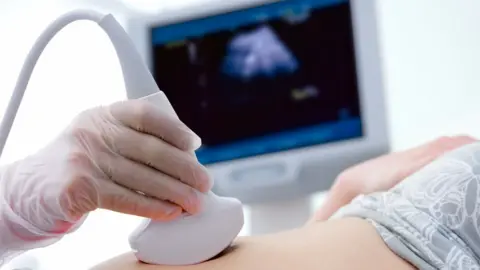Royal Glamorgan maternity staff shortages 'significant'
 Getty Images
Getty ImagesMore details about the scale of the issues facing maternity services in Cwm Taf health board have emerged.
They show concerns about "significant" maternity staff shortages continued even after an investigation was announced into the deaths of 27 babies.
Healthcare Inspectorate Wales (HIW) found serious problems at Royal Glamorgan hospital, which warned of a potential risk to patient safety.
The health board said it had addressed "all of the immediate concerns".
The HIW held an unannounced inspection at the Royal Glamorgan in October.
This was less than two weeks after Cwm Taf health board revealed it was reviewing the care of dozens of babies in the south-east Wales valleys, who had died or suffered "adverse outcomes".
This now stands at 43 cases, including 22 stillbirths and five deaths shortly after birth.
- Maternity staff shortages on every shift on a regular basis - staff told inspectors there was "only sometimes, or never enough staff to enable them to do their jobs properly"
- They worked long hours to cover rota gaps - with the risk that decisions could be impaired due to fatigue
- Workers were drafted in from community services to cover at the hospital - potentially compromising the skills mix on shifts
- Compulsory training for staff, incident reviews and ward audits not being completed, with overstretched staff having to prioritise day-to-day care
- Emergency equipment and drugs not being regularly checked
Some of the concerns were so serious that HIW issued an "immediate assurance letter" requiring the health board to act within seven days.
Overall the inspectors warned of "potential risk to the safety of patients" unless the problems were addressed.

Along with concerns about staff shortages inspectors found other problems relating to communication, culture and leadership.
These included staff feeling their concerns would not be acted upon, a "blame culture" and a lack of confidence in senior managers.
However HIW did find frontline staff were trying their best to care for patients with dignity and respect in difficult circumstances, with patients generally positive about the care and treatment provided to them.
Apart from Cwm Taf's ongoing internal investigation, the Welsh Government has commissioned a separate and wider independent review, led by the Royal College of Obstetricians and Gynaecologists and the Royal College of Midwives.
As a result of a visit in January, a series of immediate actions were agreed.
This included bringing forward the admission criteria of premature babies at the Royal Glamorgan hospital from 28 to 32 weeks - with babies needing doctor-led care now treated at Prince Charles Hospital in Merthyr Tydfil from the start of March.
But BBC Wales - after obtaining correspondence under a Freedom of Information request - can reveal that In January the health board back was also implementing other urgent actions including:
- Ensuring consultant cover within 20 minutes for the labour ward and that there was sufficient cover for the high-risk pregnancy clinic
- Immediate extra support for junior doctors which was judged to be "inadequate"
- Addressing the "high usage" of locum doctors and giving more support for new midwives
The correspondence includes a letter from Cwm Taf's chief executive Allison Williams to staff, which includes an apology for managers not listening.
In the letter she states it was "clearly unacceptable and I am sincerely sorry" that staff did not feel sufficiently engaged in the management, developments and changes in maternity services.
In a statement to BBC Wales, Ms Williams said: "We take our responsibilities for patients extremely seriously and are determined to do everything necessary to deliver a high quality maternity service that provides safe and effective care.
"Since the HIW inspection in October, actions to address all of the immediate concerns have been taken."
She said that included measures to improve staff rotas and cover, and improved procedures for flagging concerns.
The health board has also just implemented long-planned changes to the way maternity services are delivered in the area, with consultant-led care delivered at Prince Charles hospital in Merthyr Tydfil and the Royal Galmorgan hospital becoming a midwife-led unit.
"We believe these changes will help us to address the challenges that we have faced, particularly around staffing, and provide us with an opportunity to improve the care we provide to women and their families," added the chief executive.
